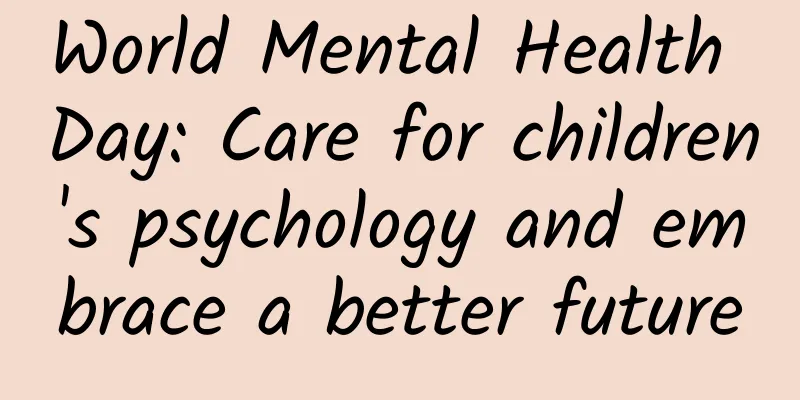World Mental Health Day: Care for children's psychology and embrace a better future

|
Author: Zhang Cheng, Department of Clinical Psychology, Beijing Huilongguan Hospital Zhang Xueqian Department of Clinical Psychology, Beijing Huilongguan Hospital Reviewer: Liu Huaqing, Chief Physician, Department of Clinical Psychology, Beijing Huilongguan Hospital World Mental Health Day was initiated by the World Psychiatric Association (WPA) in 1992 and is held on October 10th every year. Its purpose is to raise public awareness of mental developmental disorders, share scientific and effective knowledge about the disease, and eliminate public prejudice. Countries around the world prepare a variety of activities for "Mental Health Day" every year. This year is the 32nd World Mental Health Day, and the theme is: Promoting children's mental health and jointly safeguarding a better future. Figure 1 Copyright image, no permission to reprint The mental health of children and adolescents not only concerns every family, but also the future development of the entire society. According to statistics, the incidence of mental health problems among children in my country is rising, and more and more children are suffering from mental health problems. Today, let us talk about children's psychology and protect their health. 1. The meaning and standards of children's mental health Children's mental health refers to the cognitive level, emotional characteristics and personality traits of children corresponding to their age. Children with good mental health can effectively control their behavior and control their emotions in most cases, can deal with various situations in the environment in a relatively appropriate way, have good adaptability, have good interpersonal relationships in social interactions, and experience happiness and joy. The level of children's mental health can be assessed from the following four aspects. First, a correct self-concept. A mentally healthy child can not only recognize, acknowledge, and accept himself from a realistic perspective, but also be self-aware, that is, he can objectively and appropriately evaluate his abilities, strengths, and personal strengths and weaknesses, and he is neither conceited nor inferior. He enjoys life, has a wide range of interests, and has a correct outlook on life. He unifies his needs, motivations, goals, and behaviors based on this. Second, appropriate behavior and emotions. Mentally healthy children have emotional reactions and behavioral manifestations that are consistent with their age and are adapted to the social roles they play. They maintain the unity of commonality and individuality of a certain age, consciously abide by behavioral norms, express and control their emotions appropriately, and take positive measures to get rid of negative emotions when they encounter troubles and setbacks. Figure 2 Copyright image, no permission to reprint Third, good social interaction. Mentally healthy children tend to be sociable, have a desire for interpersonal communication, can establish good and stable interpersonal relationships with people around them, are good at respecting and understanding others, correctly treat others' shortcomings and deficiencies, are kind, sincere, tolerant, and fair to others, and are good at getting along with all types of people. Fourth, a positive attitude. Mentally healthy children can enjoy learning and life. When they encounter setbacks and difficulties, they can use normal self-defense mechanisms to keep their psychology in a good, positive and balanced state, and have a high psychological endurance. In addition, mental health is a continuous and fluctuating state. In the past, we viewed health and unhealth as two extremes of either one or the other. Now we believe that it is a continuum with fluctuations, and there is a lot of space between health and unhealth. If a child's mental state is not good, targeted adjustments can be made to achieve a mental health level. In particular, it should be noted that caring for children's psychology should start from childhood, and it is particularly important for children aged 0 to 3 years old. Parents should pay attention to keeping their emotions stable and have a certain degree of self-reflection, so that children can easily adjust well; if it is found that the adjustment is ineffective and the mental state seriously deviates from the mental health standard, then it is necessary to seek medical treatment in time to obtain the help of professionals and achieve early diagnosis and early treatment. Figure 3 Copyright image, no permission to reprint 2. Common mental disorders in children Common childhood mental disorders can be roughly divided into the following categories: 1. Learning disabilities : Learning disabilities refer to psychological disorders that are concentrated in specific learning situations. The following mainly introduces three types: dyslexia, mathematical disabilities, and attention deficit hyperactivity disorder. Dyslexia is the most common learning disability. Patients often cannot remember words, have difficulty with dictation and pinyin, add or subtract words when reading aloud, and have slow reading speeds. Mathematical disabilities are characterized by poor ability in mechanical graphics and mathematical tasks. Patients may love reading and can tell stories, but cannot remember faces and have poor communication skills. People with attention deficit hyperactivity disorder often have poor concentration, are particularly active, restless, and have impulsive behaviors. 2. Developmental disorders : Developmental disorders refer to psychological and mental disorders that occur during a person's development process. The following mainly introduces three types: autism, schizophrenia, and mental retardation. Autism is characterized by obvious defects in social and communication skills and stereotyped interests and behavior patterns; the main characteristics of schizophrenia are severe psychotic symptoms, such as delusions, hallucinations, thinking disorders, behavioral disorders, emotional indifference, etc.; mental retardation is a syndrome of mental retardation or obstruction, characterized by intellectual disability and difficulty in social adaptation. Figure 4 Copyright image, no permission to reprint 3. Emotional disorders : Emotional disorders refer to an individual's serious detachment from reality in terms of emotional feelings, and he or she responds to external things in a way that hinders problem-solving and is self-defeating. The following mainly introduces three types: depressive disorders, anxiety disorders, and obsessive-compulsive disorders. The main manifestations of depressive disorders are low mood, loss of interest in life, frequent self-blame or guilt, repeated suicidal thoughts or suicidal or self-harming behaviors, and physiological manifestations such as poor sleep and decreased appetite. The main manifestation of anxiety disorder is nervousness, fear, heavy worries, restlessness, and constant fear in the absence of sufficient factual basis and objective factors, often accompanied by symptoms of autonomic nervous dysfunction such as shortness of breath, palpitations, sweating, and frequent urination. Obsessive-compulsive disorder is characterized by repetitive thinking in the brain, that is, even though one knows there is no need to think about something, it is difficult to control oneself. It also includes compulsive behaviors, such as repeatedly washing hands, repeatedly checking, and repeatedly doing certain actions, which cause oneself pain, seriously affecting social interaction and life, and making it impossible to study and live normally. The above introductions are only the main manifestations of various common mental disorders. If you need a professional diagnosis, it is recommended to go to a regular psychiatric hospital or the psychiatry or psychology department of a general hospital for consultation and treatment. 3. Small ways to improve mental health There are small things we can do to improve our mental health. First, do proper exercise and learn relaxation techniques. Exercise can help release negative emotions and energy accumulated in the body, promote the secretion of pleasurable substances such as dopamine, and help relieve mental stress. Some breathing relaxation techniques, mindfulness techniques, etc. are also effective ways to improve mental health. Second, get enough sleep and eat a healthy diet. If you sleep less, you may feel depressed and have a negative impact on your mental health. It is recommended that you get 7 to 8 hours of sleep a day. Eat more fresh fruits and vegetables and reduce the intake of processed foods and sugar, which can improve your body's functions and help you maintain emotional stability. Figure 5 Copyright image, no permission to reprint Third, maintain social frequency and provide emotional support. Social interaction is essential for mental health. Friends, family, and classmates can provide emotional support to children, giving them a sense of belonging and security, and reducing psychological stress. Therefore, you can consciously spend more time socializing with friends and family members who get along well with you, and have regular gatherings. Fourth, seek regular psychological counseling and professional help. If the child encounters some problems that he or she cannot solve for the time being and affects his or her work, study, and life, he or she can seek help from a professional psychological counselor to learn some effective stress management techniques, positive thinking patterns, etc., to help the child restore good social functions. The heart is like a mirror, always wipe it. In life, our children will encounter many pressures and challenges, and may also encounter various psychological problems. Let us deal with them scientifically, care for children's psychology, and embrace a better future! |
<<: Sleeping more ≠ sleeping better
>>: Approaching adolescent depression: Why do we often ignore children’s suffering?
Recommend
Does the menstrual cycle start from the first day of menstruation?
I believe that every woman should be very familia...
Can syphilis have children?
Children are the continuation of a family, and ev...
What is the difference between maocai and hotpot? What ingredients are in maocai?
Maocai is a dish made with meat, soy products, ve...
Symptoms of acute urinary tract infection in women
The symptoms of acute urinary tract infection are...
Is it normal to not urinate frequently during pregnancy?
After pregnancy, a woman's body will undergo ...
Can crabs and bitter melon be eaten together? Why can bitter melon help lose weight?
Bitter melon contains bitter melon and some bitte...
Causes of meconium-stained amniotic fluid
If there is fecal contamination in the amniotic f...
Menstrual periods are scant and dark in color
When women reach their menstrual period, they may...
Causes of calf cramps during pregnancy
Women's physical condition is relatively weak...
Having sex after taking birth control pills
In daily life, when couples or lovers have sex an...
What kind of injection can relieve pain for dysmenorrhea?
Many women suffer from dysmenorrhea. When dysmeno...
Occasional throbbing pain in the left lower abdomen of women
Women's left lower abdominal pain, that is, p...
What are the symptoms of vulvar cyst?
Vulvar cysts sometimes attack very quickly, and w...
Tips for removing blood stasis during menstruation
The vast majority of women suffer from body coldn...
7 toxins that cause women to age overnight
Under normal metabolism, the food people eat pass...









